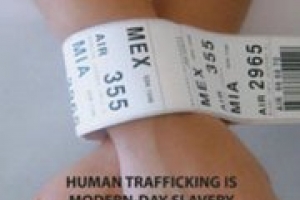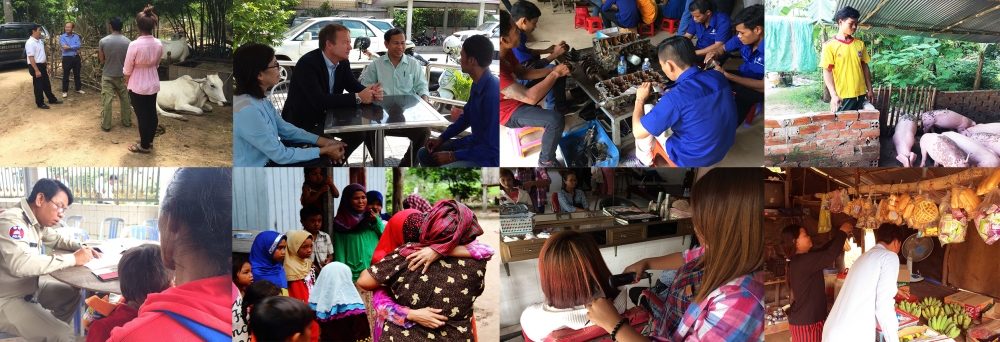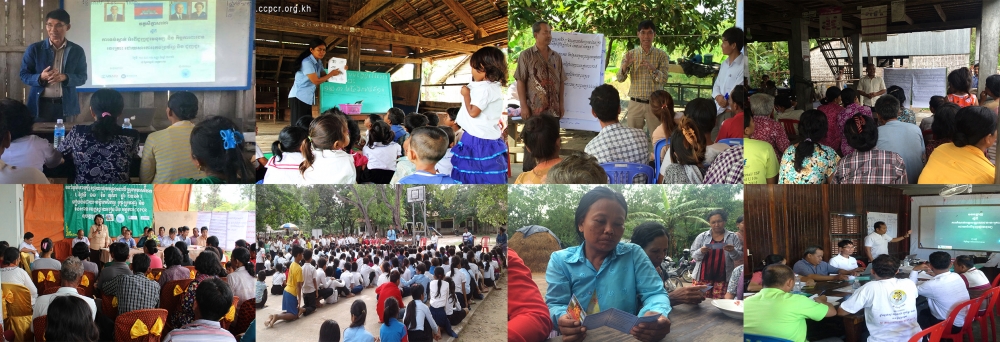Cambodia

Cambodia is an impoverished nation that has just recovered from it's unstable past. In the last 40 years, the country has seen civil war and undergone invasions by South Vietnam, the United States, and later by a reunited Vietnam. The Khmer Rouge government destroyed much of the country's infrastructure - educationally, politically, financially and culturally leaving the country in a state of disorder. However, in the late 1980's, Cambodia entered a time of relative peace and reconstruction.
Poverty is still widespread throughout the country with many living on less than US $1 a day and over 30% of the population living below the national poverty line (2007 World Bank). Crop failures, weather conditions, environmental degradation, health problems, and landlessness result in extreme vulnerability among families. The poor economic situation can often result in child labor and exploitation as families try to make ends meet. Young girls are often trafficked or lured into brothels by the promise of high paying jobs or lucrative economic opportunities. The cycle of poverty is perpetuated through the loss of education and training.
Human Trafficking in Cambodia
The Problem; the sexual slavery of children and youth in Cambodia
The concept of human trafficking has many facets; however, of concern to CCPCR is the trafficking of children, youth and young women particularly from rural poor rural regions of Cambodia and Vietnam for commercial sexual exploitation. The trafficking of children for commercial sexual purposes is an endemic problem in Cambodia and has rightly become the focus of domestic and international human rights concerns.
Cambodia is primarily a source but also a transit and destination country for human trafficking. According to the US Department of State’s Trafficking in Persons Report (G/TIP, 2010), the Cambodian government did not show evidence of protecting trafficking victims and was therefore placed on the Tier 2 Watch List. The US Central Intelligence Agency cited Human trafficking as ‘the most pressing social issue in Cambodia today’.
As it stands today, at least 1 in every 150 Cambodian people are commercial sex workers, 45% of these are HIV positive and at least 30,000 are children (including cases of 6 year old girls being sold for $70). This illegal sex trade in Cambodia generates traffickers and corrupt officials approximately $500 million a year. Exploitation through sexual slavery, trafficking and prostitution in Cambodia is enormous in scale but it doesn’t stop there; domestic violence is an even more frequent concern because of the ‘normalcy’ of it. Even worse, according to Cambodia Women's Crisis Center (CWCC), rape victims 10 years old and below account for 18% of the total number of cases reported.
Most rural regions of Cambodia suffer from extreme poverty due to the low value of agricultural production and the long-term effects of decades of civil war. Most provinces experienced years of turbulent Khmer Rouge activities, and the effects of living for decades in dire poverty in regions engulfed by violence have created a volatile, precarious environment in which serious human rights violations continue to prevail.
These poor rural communities have proved to be a fertile environment in which unscrupulous individuals prey on vulnerable young people. Child prostitution rings and sex abusers commonly draw their victims from the poorest families in the communities. Some families have been mislead into believing that they are sending their child away to earn good money to send back to the family, while others have been tricked by people they trust such as friends, other family members, or people posing as respectable business men or women. With the “agreement” of the family, the child is then sold to brothels and locked into sexual slavery. If the child ever gets the opportunity to return to their community they are often confronted by reactions of contempt from the local population and sometimes even their own families, as they struggle with the stigma of their new identity. Social norms attach high value to women’s chastity and stipulate that women remain virgin’s until marriage. Deviation from these norms, even through rape may result in the victim being shunned by society and deemed unfit for marriage.
The idea that females are disposable commodities still exists in Cambodian society, aggravated by the disproportionate value placed on virginity and other prevailing social and cultural norms that perpetuate a widespread lack of respect for women. This leads to high levels of sex trafficking, domestic violence, rape and abuse. Poverty, illiteracy, family issues, gender discrimination, inadequate protection under the law increased together with uncontrolled tourism and high unemployment all provide fertile breeding grounds for vulnerabilities resulting in 1 in 40 Khmer children being sold into sex slavery.
Learn More About Cambodia
Activities
- Child Pursues Education, After CTIP Supports on Business to Family
- Vulnerable People sharing Experienced on Benefit of Raising Chicken
- Helping Vulnerable Families Improve their Lives
- Trafficking Survivor Sharing Experience of migration
- My Dream Came True as a Barber
- Former Trafficked Victim Got supported to Improve Livelihood
- Livelihood Supported to Pursue Hope
- âMy Dream Come True with Hair Dressing and Salon Businessâ
- Rice Bank Met the Need of People to Stop Risky Migration
- Pig Raising to Improve livelihood of Survivors
- "Cows Bank", is the Resource of Sustainable Livelihood
- We Together to End Human Trafficking
- From Miserable Life to Get a Skill of Hairdressing
- SVG Trained Beneficiary to Be Sustainable Farmer
- Local Leaders Share Lessons Learned and Plan for Sustainable Anti-Trafficking Efforts
- Successful Collaboration to Return 33 victims from Vietnam
- Survivors of Labor Trafficking Receive Support to Pursue Safe and Sustainable Income Sources
- CCPCR Conducts a Chicken and Pig Raising Training for Capacity Building
- 23 Labor Trafficking Victims Were Back to Community Successfully
- Chinese Guests Visited CCPCR to Hear Experience of working with Human Trafficking Victims
- AOI's Students Visited Child Prevention Project
- Collaborative Effort Leads to Successful Repatriation of 54 Cambodian Men Trafficked to Fishing Boats
- Risky Migrationâ Lead to Trafficking Issues
- Livelihood Training Workshop on Chicken and Pig raising to Victims and Victims'family
- 15 Survivors Returnedâ back to Community With New Life
- 4 victims of human trafficking from Vietnam, Returned Back Successfully
- Eleven Trafficked Children to Beg in Vietnam, Returned to Cambodia
- CTIP Secures the Second Chance at Education for 22 Trafficked Children Forced to Beg in Vietnam
- National Verification Process in Thailand
- Press on After Trafficking Launch
- Angkor Wat Bike4Kids! Event
- Radio Australia Broadcast
- Featured in Global South Development Magazine
- A major fundraising campaign for CCPCR!
- CCPCR's Christmas party!
- Painting in Phnom Penh!
- Sihanoukville Shelter - Can you help?
- Lotus House - Siem Reap
Download Document
- Local Leaders Share Lessons Learned and Plan for Sustainable Anti-Trafficking Efforts
- Successful Collaboration to Return 33 victims from Vietnam
- 2015 Annual Report
- Snapshot-Forum Empowers Human Trafficking Survivors to Make Recommendations to Policymakers and NGOs
- Snapshot-Survivors of Labor Trafficking Receive Support to Pursue Safe and Sustainable Income Source
- CCPCRâs Prevention Activities for October
- CCPCR CSO Certificate certified and approved by Minister of Ministry of Social Affair
- Case study - IOM training on representatives of 14 child clubs
- 2014 Annual Report
- Case study - Child Club in Thmei commune
- Case Study - Teng Mao Community
- Case Study - Training on pig farming in Thnout commune
- Case Study - Community Learning Centre in Chres commune
- Case Study - Parental Group in Tuol Ampal village
- Case Study - Child Club in Kandal Village in Thnout
- More than just victims- the truth about human-trafficking
- What are you grateful for?
- Shelter Appeal
- CCPCR's Rehabilitation strategy
- Organizational Chart
- CCPCR's Child Protection Policy
- Human-trafficking in Cambodia
- Human Trafficking FAQ's
- Statement for human rights day, December 10, 2014.
- Current situation on process to migrate to Thailand in EN
- Current situation on process to migrate to Thailand in Kh
- 2013 Annual Report
- 2012 Annual Report
- Svay Rieng Shelter
- 2011 Annual Report
- 2010 Annual Report
- Svay Rieng Presentation 2010
- CCPCR's Rehabilitation strategy






